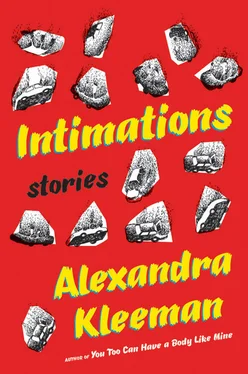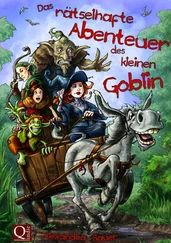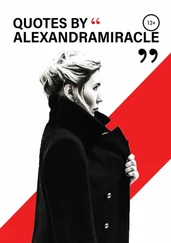“I am re-creating a website,” said Martin, sitting up and blinking at her with his round, factual eyes. “It is an artist’s website, a photographer. I create the infrastructure,” he said, drawing something like a box in the air with thin fingers.
“I am from Germany,” he said.
“Oh,” said Karen. “That’s interesting.”
“I am here for work,” said Martin. “I am staying in the neighborhood, with a friend. We work together on this project. We had a great deal to do.”
“I’m writing an article,” said Karen. “Beginning an article,” she explained. She felt self-conscious. She could no longer talk about her troubles with the article without revealing herself to be a disaster. “It’s on a farmer, a dairy farmer. Who is supposed to be a genius at cows.”
“You must have to go far to find a cow in this part of the country,” he said, “unless I am misunderstanding.”
He had a very gentle voice. He didn’t seem to know much about agriculture. He asked about the size of the farm, the distance from the city, and about the cows — were they gentle? They were very gentle. They were tender with their young. But they weren’t really interested in anyone. It made them easier to slaughter: up until the very moment of the act you could imagine they might not notice. Karen twisted open the bottle of water and took a small, polite sip. She was becoming interested in herself again after several weeks of wishing she could be anybody else. Did she like milk very much? Yes, she did, this is how she found the story, she drank the wonderful milk that cost $13 a bottle and then began to investigate where it came from and how it could be so good. It was three o’clock in the afternoon and the grayish winter light looked flat through the plate glass windows. She had a sense of her face as flexible, soft. This was the longest that Karen had talked to a person since Vanessa’s birthday party last week where Vanessa had compromised herself with whiskey sodas and made Karen promise never to get back together with Tim, ever, because he was a sneak and a pervert, practically a stalker and she could do so much better, she was better off. Vanessa and Tim had been friends since college, but after the breakup Vanessa said she was choosing Karen. “I’m not saying Tim’s a terrible person,” she said, “he’s a mediocre person. But he’s one of those people who won’t let up. He thinks he can wear you down, and he can.”
When Martin asked her if she’d like to go next door and have a pizza, she didn’t think about whether it would be awkward. She thought about how normal it was to talk to someone, to drink coffee, to thrust your face into full view of other faces, to let the daylight grime up your skin. “I think I can take a break,” Karen said abstractly, like one being shaken out of deep concentration, “but I’ll need to come back afterwards, I have a deadline coming.” They put their things into bags and stood up. He tried to carry her bag, but he kept dropping it.
A middle-aged man and woman were sitting at the tables closest to the exit. They sat separately, but had identical laptops. “You know what,” Karen heard the man say as she passed by. “I haven’t dreamt in a very long time.”
In the pizza restaurant, Martin looked five years older. A waiter brought them ice water in green-tinted glasses of pebbled plastic, and straws. Karen watched as Martin tore the tips from the paper casings of the straws and gently pulled them off. He split the remainder of the wrapper down its seam precisely, like he was undressing a doll. She wondered whether this had to do with being German. Karen didn’t use the straw he had prepared for her. She lifted the glass to her lips and drank the cold, slightly sour water. Ice tapped against her teeth. She felt like she was going to cry, but then inexplicably she felt okay again. Food was disgusting, but she had to eat it anyway. Martin was telling her that he, too, had been interested in writing for a brief time. He had become involved in film criticism during his time in the media studies program at Humboldt University in Berlin. In those days he used to watch a film each night, walking a mile and a half back home along the Spree River. He liked to see the other regulars there, although he never spoke to them — the old man with the antique briefcase, the young mother who brought her slumbering infant. He thought that he might even write a book on Carl Theodor Dreyer’s work, in particular the film Vampyr.
“Why Carl Dreyer?” Karen asked.
“Carl Theodor Dreyer,” said Martin. “This is like asking ‘Why history? What is interesting about history?’ It is not a matter of interest. There is no opinion on it.”
“I haven’t seen Vampyr, ” she said.
“Oh,” he replied. “It’s quite all right.”
In her weeks at Ned Regan’s farm, Karen had seen why they called him a genius. With a long, knuckly arm, Ned guided cows from field to shed, weaving them through the gates like huge, slow-moving agility dogs. When yield fell below Ned’s expectations, he knew how to adjust the feed, supplementing grass with alfalfa, fenugreek, thistle. With firm pressure on the flank he could signal a cow to slow or stop, with a deep, low groan he could still an anxious mama and she would let him come close and take her knobby calf into his rough hands. In the empty restaurant Martin seemed to be having a nice time. His smile had grown easier, he was marveling at the menu. All of this was locally grown? Here, so close to the city, the marvelous towers of cold, hard glass? He suggested they order the “Bad Girl,” a pizza with four different types of cured meat on it, plus smoked cheese and green onions. Over by the register, their waiter was talking to a waitress in a black tank top. “That’s terrible,” he said, patting the countertop instead of her hand. “That’s not all,” replied the waitress. Karen told Martin that she would prefer a different pizza. The only meat that she ate these days was beef: somehow, after having spent so much time with the cows, she felt certain that they meant her no harm.
When the pizza came, it was covered in mushrooms. They had the earthy smell of something that has been buried and then dug up. Martin said he would also like a beer, but Karen told him she had to write later. They were the only customers in the whole place, it was too early for dinner. The sky seen through the windows was a pale, even gray as though it had been scrubbed bare. Martin had nice skin. With his small front teeth, he nibbled at a mushroom, seizing it delicately and pulling it from the pizza. He was nice, and he asked good questions. He asked whether Karen had traveled much and if, when she did, she felt like a different person. He asked if she liked to know where her food came from, or whether she preferred to think that it had been created just for her at that moment. He asked if she often met strangers in the coffee shop and then went with them to eat pizza, and she told him honestly that she never had before. She didn’t tell him that she hadn’t spoken to anyone besides Vanessa in the past week and even that had been strange, stilted and vague as they spoke surrounded by Vanessa’s other friends, hard-eyed young women from the world of television news. Martin would be here, in this city, in this neighborhood, for a few more days. He would be completing the project with his friend who also lived in the neighborhood, in a loft building overlooking the motorcycle-themed Biergarten. Perhaps Karen and his friend were neighbors. There was a gallery event on Thursday that she might be interested in attending. Or she could show him some of the other sights of the neighborhood, like the grocery store operated by the Korean family that also sold martial arts merchandise and kung fu DVDs. Their waiter was no longer talking to the waitress in the black tank top, though they stood near each other still. Martin ordered a large can of beer from the waiter, and when it came Karen ordered one too.
Читать дальше












